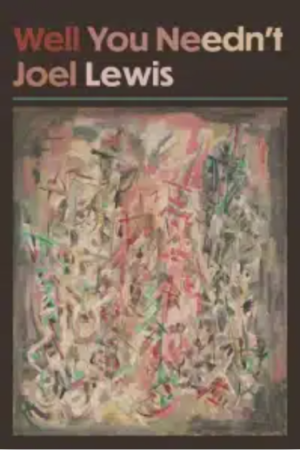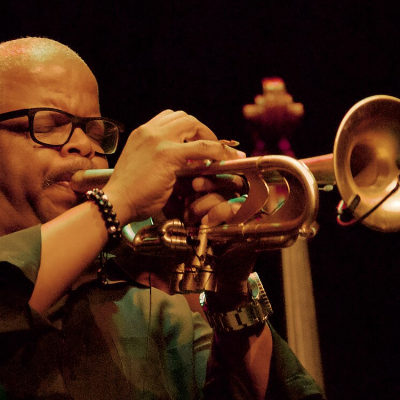.
.

Well You Needn’t, by Joel Lewis
[Hanging Loose Press 2024]
.
.
___
.
.
A Review…
By Mitch Highfill
.
…..When I first discovered the music I was in a big car going across the country with two poets and a future computer engineer. I remember hearing Jackie McLean’s “Slow Poke” on the cassette deck in the car, transfixed by the manipulation of time and the deep groove that resulted from it. I was hooked. The next recording that snapped my head around was “Brilliant Corners” (the song) by Monk.
…..My companions in the car were well learned in the hard bop and free jazz frequency, they knew who the sidemen were on the recordings, and they referenced other recordings that I was now hot to hear. I was struck by the verbally inspired phrases of the horn, how a lyrical phrase could be restated by a tenor or even a standup bass. How soloists conversed in the vocabulary of musical notes. It was a great revelation to me and it still is. The relationship between language and music comes into focus in particular pieces of music in ways that I had never imagined before. I had entered a community of nerds who hunted down specific records in used record stores, combing over the liner notes frantically hoping this record would be the one we were dying to hear. As addictions go, jazz is probably safer than oxy, but it is not cheaper.
…..Joel Lewis’s book Well You Needn’t is a jazz fans’ delight – a unique cornucopia of poetry and memoir. Six prose sections of “My Life as a Jazz Fan” are interspersed with poems that evoke the clubs where the greatest 20th Century composers plied their trade. From Albert Ayler to Stan Getz and back again, Lewis shares anecdotes, quotations and scenarios that illuminate the personalities that create the music.
It gives me something
To think upon other
Than the political
Bad weather.
…..As we step into a challenging and unsettling political era, it is good to have a touchstone, something true and beautiful to hold on to. For jazz fans, it is not just the sound of the music, it is the whole culture that captivates and instructs us. What is freedom and how does it relate to structure? How does time lengthen or shorten itself in melody? How does the horn embody the human voice in phrasing? How to use silence as a strategy, and how to listen to the deepest expressions of human feeling in real time.
…..Lewis explores this territory with years of listening and years of interacting with musicians and engineers and critics in his critical writing and in interviews with the same. His distinctive poetry informs and clarifies; no wasted words, using the musical rhythms of plain speech. That music is in fact how poets have been influenced by jazz, and how jazz is a poetical musical form to begin with. Lewis doesn’t have to tell us this, as he demonstrates:
The ancient micro-lapel sport jacket
Tassled oxblood loafers scraping an
Approximate 4/4 rhythm
On the curbstone alleys.
…..Here the vowels cavort with the consonants like an alto solo dances across a familiar phrase. Joel is not the first poet to work with jazz, of course, but he is one of the most entertaining to do so. Throughout the book, he drops plums of insight into the human condition;
Reverie has a class bias. Then
Add to that the glaze of omission
And treated as less
Than foot traffic.
…..The memoir sections demonstrate a lifelong devotion to jazz and jazz culture. Very relatable to those of us who haunted the cutout bins at J&R Music World, where Blue Note CD’s could be had for three or five dollars a pop. Here Lewis tells us how he came to be the musical maven that he is. Like Phil Schaap (the late, great WNYC, WBGO & WKCR radio host), Joel knows so much more than time allows him to tell; unlike Schaap, Joel’s prose is deeply poetic and opens one’s ear to the next tune which is already queued up in his head.
…..Well You Needn’t is a must for jazz fans, and a superb collection of poems and prose from a reliable voice. It is a deep dive into a world I can’t get enough of.
.
.
___
.
.
Mitch Highfill is a poet, researcher and jazz fan who lives in Brooklyn, NY. He is the author of Five (Lunar Chandelier Collective) and Liquid Affairs (United Artists).
.
Editor’s note…Joel Lewis’s essays have been published several times on Jerry Jazz Musician. He has a passion for jazz music and its history like few people I have ever encountered. Want an example? I invite you to read his essay Rudy Van Gelder, Jazz Music’s Recording Angel, which, like his book, is a unique blend of historical fact and personal journey.
The book Mitch writes about is an absolute gem.
-Joe Maita
.
.
Listen to the 1962 Blue Note Records recording of Jackie Mclean performing his composition “Slow Poke,” with McLean (alto saxophone); Kenny Dorham (trumpet); Sonny Clark (piano); Butch Warren (bass); and Billy Higgins (drums).
.
.
Listen to the 1957 recording of Thelonious Monk performing “Brilliant Corners,” with Monk (piano); Sonny Rollins (tenor saxophone); Ernie Henry (alto saxophone); Oscar Pettiford (bass); and Max Roach (drums). [Universal Music Group]
.
Click for:
Information about Kinds of Cool: An Interactive Collection of Jazz Poetry
More poetry on Jerry Jazz Musician
“Bluesette,” Salvatore Difalco’s winning story in the 67th Jerry Jazz Musician Short Fiction Contest
More short fiction on Jerry Jazz Musician
Information about how to submit your poetry or short fiction
Subscribe to the (free) Jerry Jazz Musician quarterly newsletter
Helping to support the ongoing publication of Jerry Jazz Musician, and to keep it commercial-free (thank you!)
.
___
.
.
Jerry Jazz Musician…human produced since 1999
.
.
.



































